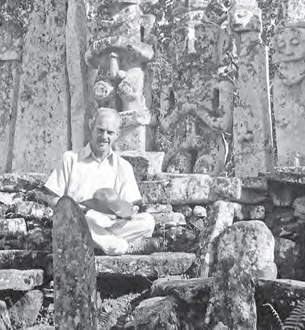Frederic Martin Schnitger's father owned a sugar cane plantation on the island of Java (then part of the Dutch East Indies) and his mother was a teacher. After finishing school in the Netherlands, Frederic Martin Schnitger studied Oriental languages, archaeology and the history of Southeast Asia at Leiden University from 1932 to 1935. In 1935, he went to the island of Sumatra for archaeological research, where he helped to set up the Palembang Museum. From 1935 to 1938, he travelled between Sumatra and Europe. He continued his studies in archaeology and ethnology at the University of Vienna from 1936, graduating with a doctorate in February 1938. The English-language version of his dissertation entitled The Archaeology of Hindoo Sumatra, published in Leiden in 1937, met with great interest among experts, and even more so his book Forgotten Kingdoms in Sumatra, published in 1939, which is still considered an important contribution to the archaeology and ethnography of Sumatra today. Although the then 27-year-old already had around 150 scientific and popular science articles to his name, he had problems making a living. In January 1940, he found a job – initially unpaid – in the library of the Museum of Ethnology (MVK, now the Weltmuseum Wien), and at the end of 1942, he was offered a position for the duration of the war. Schnitger was demonstrably in contact with the SS organisation Deutsche Forschungsgemeinschaft Ahnenerbe. Maria (Ria) Horksy, a member of the NSDAP since 1934 and employed at the MVK since 1938, obtained her doctorate in ethnology only in July 1941 and took over the management of the museum's South Sea and Indonesian collection already in 1942. She plotted against Schnitger, whom she saw as an unwelcome competitor. Schnitger, for his part, sent a report to the Gestapo in which he accused Horsky of espionage against the German Reich, among other things, while Horsky reported him for allegedly damaging an item of clothing. The director of the MVK, Fritz Röck, accused Schnitger of stealing and wilfully damaging museum property – books, photos and maps. The Gausippenamt in Vienna established that Schnitger's great-grandmother on his mother's side had been Chinese. He was arrested on 1 March 1943 and registered by the Gestapo "Abwehr" department for identification purposes. On 14 September 1944, the Vienna District Court for Criminal Matters found him guilty of defamation, including that of Horsky, but acquitted him of the charge of theft of museum property due to insufficient evidence and sentenced him to one year in prison. On 22 November 1944, Schnitger was taken into "protective custody" by the Gestapo, who transferred him to the Mauthausen concentration camp on 12 March 1945. Frederic Martin Schnitger died there, after being sent to the so-called "Sanitätslager" on 23 April 1945, shortly before the liberation of the concentration camp. Ria Horksy, released from the MVK at the end of July 1945 because of her membership in the NSDAP, was found dead in a mountain hut in Styria in February 1949.
Frederic Martin Schnitger

Gabriele Anderl/Reinhold Mittersakschmöller, Gefährliches Spiel mit dem Feuer: Frederic Martin Schnitger, Archäologe und Indonesienforscher, in: Andre Gingrich/Peter Rohrbacher (Hg.), Völkerkunde zur NS-Zeit aus Wien (1938–1945), vol. 2, 687–720.
Gabriele Anderl/Ildikó Cazan-Simányi/Reinhold Mittersakschmöller, “Rivalries with Fatal Consequences,” History of Anthropology Review 46 (2022), URL: histanthro.org/notes/rivalries-with-fatal-consequences/ (14.6.2024)
Marieke Bloembergen/Martijn Eickhoff, The Politics of Heritage in Indonesia: A Cultural History, Cambridge 2020, 186–190.
Ildikó Cazan-Simány, Zum Fall Dr. Horsky: Konflikte, Rivalität und Denunziation, in: Andre Gingrich/Peter Rohrbacher, Völkerkunde zur NS-Zeit aus Wien (1938–1945), vol. 2, Wien, VÖAW, 2021, 723–740.
DÖW, Opferdatenbank des Dokumentationsarchives des österreichischen Widerstandes, Gestapo-Opfer, politisch Verfolgte, Eintrag zu Martin Schnitger, URL: www.doew.at (5.5.2024).
John N. Miksic, Introduction to F. M. Schnitger, Forgotten Kingdoms in Sumatra (Singapore: Oxford University Press, 1989, ix.
Auswahl:
Frederic Martin Schnitger, Ein Beitrag zur Archäologie und Kulturgeschichte Sumatras. Dissertation, Wien 1937.
Frederic Martin Schnitger, The Archaeology of Hindoo Sumatra. Internationales Archiv für Ethnographie, Bd. 35, Supplement, Leiden 1937.
Frederic Martin Schnitger, Forgotten kingdoms in Sumatra, Leiden 1939.
Frederic Martin Schnitger, Schönes Indonesien, Stuttgart 1941.
Frederic Martin Schnitger, Madagaskar, in: Hugo A. Bernatzik (Hg.), Afrika. Handbuch der angewandten Völkerkunde, Innsbruck 1947, 1323–1334.
BArch Berlin-Lichterfelde, NS 21/2333 (SS-"Ahnenerbe"), Friedrich Martin Schnitger.
BArch Berlin-Lichterfelde, R 73/14448, Deutsche Forschungsgemeinschaft (SS-"Ahnenerbe"), Dr. Martin Schnitger.
BArch Berlin-Lichterfelde, R 9361-V/35501, Sammlung Berlin Document Center (BDC): Personenbezogene Unterlagen der Reichskulturkammer, Martin Schnitger.
KZ-Gedenkstätte Mauthausen/Mauthausen Memorial, Archiv, Häftlingszugangsbuch, AMM/Y 36 b; Totenbuch, AMM/Y 46 b; Häftlingsdatenbank.
OeStA/AdR, ZNsZ, Gauakt 56.952, Ria Horsky.
OeStA/AdR, BMU, 15 B 2 a, 569–43.
OeStA/AdR, UWK, BMU, Personalakten, R8/86, Ria Horsky.
WMW-Archiv, Direktionsakten, D39/N1, D39/N2, D41/N6, D41.
WMW-Wien, P/M1/9, PA Ria Horsky.
WStLA, Gauamt für Sippenforschung, A 6, Abstammungserhebungen, Frederic Martin Schnitger.
WStLA, LG für Strafsachen, A11, Vr-Strafakten, Vr 361/44, Martin Schnitger.
